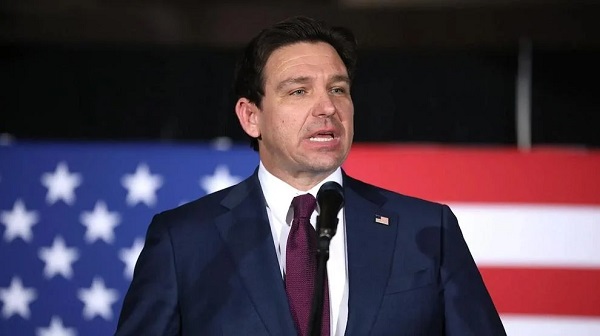Energy
Fresh Off Their Major Victory On Gas Export Terminals, Enviros Set Sights On New Target: Oil Exports

 From the Daily Caller News Foundation
From the Daily Caller News Foundation
By NICK POPE
Months after President Joe Biden handed environmentalists a major win by pausing new liquefied natural gas (LNG) export terminals, activist groups are beginning to turn their attention to deepwater oil export hubs.
A coalition of 19 climate activist organizations — including the Sierra Club, Earthjustice and the Sunrise Movement’s New Orleans chapter — wrote a Thursday letter to Biden, Transportation Secretary Pete Buttigieg and Maritime Administration Administrator Adm. Ann Phillips urging the administration to halt approvals of proposed deepwater crude oil export facilities. The letter signals that the environmental lobby is turning its attention to a new target after the White House opted to pause new LNG export hub approvals in January following a considerable activist campaign.
“The undersigned urge the White House and Department of Transportation (DOT) to halt and reevaluate its licensing review of proposed deepwater crude oil export facilities to update and ensure the validity of the agency’s “national interest” determinations and related Deepwater Port Act (DWPA) project review,” the activist groups wrote. “The licensing of massive deepwater crude oil exports leads to disastrous climate-disrupting pollution and environmental injustices and would lock in decades of fossil fuel dependence that undercut the pathway to a clean energy economy.”
Oil Export Terminals Letter by Nick Pope on Scribd
“At minimum, we ask the Administration to update its outdated analysis under the DWPA and National Environmental Policy Act (NEPA) to address the harms generated by expansive oil exports on the climate, as well as consequences for environmental justice communities along the Gulf Coast, and for the national interest in energy sufficiency,” they continued.
American oil exports are “key” to global supply, especially in the wake of Russia’s invasion of Ukraine and the resulting changes in global energy markets, according to Bloomberg News. The U.S. became a net oil exporter in 2020 for the first time since 1949, according to the U.S. Energy Information Administration, and global oil demand is expected to grow through at least 2028, according to the International Energy Agency.
“It’s hard to call yourself a Climate President when more fossil fuels are being produced and exported by the U.S. than ever before,” James Hiatt, founder of For a Better Bayou, one of the letter’s signatories, said in a statement. “Approving massive oil export terminals in the Gulf of Mexico not only exacerbates our deadly fossil fuel addiction, but also blatantly disregards the health and wellbeing of environmental justice communities in the region. This administration is acting less like a beacon of hope and more like an enabler of dirty energy. It is time for a course correction towards real climate action.”
Biden handed environmental activists a huge victory when he paused approvals for new LNG export terminals in January, instructing his administration to closely examine the climate impacts of proposed facilities alongside economic and security considerations. The LNG pause stands as one of Biden’s biggest decisions on climate through his first term, and activists applauded the move while elected Republicans and the oil and gas industry have strongly opposed it.
Well-funded environmental organizations and young voters figure to be key bastions of support for Biden in the 2024 election cycle as he attempts to secure a second term in office and prevent the return of former President Donald Trump. While the Biden administration has spent more than $1 trillion and pushed stringent regulations to advance its sweeping climate agenda, most voters remain most concerned about the economy, inflation and immigration, with a much smaller share identifying climate change as the top issue facing the country, according to recent polling data.
Neither the White House nor the DOT responded immediately to requests for comment.
Daily Caller
Paris Climate Deal Now Decade-Old Disaster


From the Daily Caller News Foundation
By Steve Milloy
The Paris Climate Accord was adopted 10 years ago this week. It’s been a decade of disaster that President Donald Trump is rightly trying again to end.
The stated purpose of the agreement was for countries to voluntarily cut emissions to avoid the average global temperature exceeding the (guessed at) pre-industrial temperature by 3.6°F (2°C) and preferably 2.7°F (1.5°C).
Since December 2015, the world spent an estimated $10 trillion trying to achieve the Paris goals. What has been accomplished? Instead of reducing global emissions, they have increased about 12 percent. While the increase in emissions is actually a good thing for the environment and humanity, spending $10 trillion in a failed effort to cut emissions just underscores the agreement’s waste, fraud and abuse.
As a nonprofit, we are dependent on the generosity of our readers.
Please consider making a small donation of any amount here.
Thank you!
But wasting $10 trillion is only the tip of the iceberg.
The effort to cut emissions was largely based on forcing industrial countries to replace their tried-and-true fossil fuel-based energy systems with not-ready-for-prime-time wind, solar and battery-based systems. This forced transition has driven up energy costs and made energy systems less reliable. The result of that has been economy-crippling deindustrialization in former powerhouses of Germany and Britain.
And it gets worse.
European nations imagined they could reduce their carbon footprint by outsourcing their coal and natural gas needs to Russia. That outsourcing enriched Russia and made the European economy dependent on Russia for energy. That vulnerability, in turn, and a weak President Joe Biden encouraged Vladimir Putin to invade Ukraine.
The result of that has been more than one million killed and wounded, the mass destruction of Ukraine worth more than $500 billion so far and the inestimable cost of global destabilization. Europe will have to spend hundreds of billions more on defense, and U.S. taxpayers have been forced to spend hundreds of billions on arms for Ukraine. Putin has even raised the specter of using nuclear weapons.
President Barack Obama unconstitutionally tried to impose the Paris agreement on the U.S. as an Executive agreement rather than a treaty ratified by the U.S. Senate. Although Trump terminated the Executive agreement during his first administration, President Joe Biden rejoined the agreement soon after taking office, pledging to double Obama’s emissions cuts pledge to 50 percent below 2005 levels by 2030.
Biden’s emissions pledge was an impetus for the 2022 Inflation Reduction Act that allocated $1.2 trillion in spending for what Trump labeled as the Green New Scam. Although Trump’s One Big Beautiful Bill Act reduced that spending by about $500 billion and he is trying to reduce it further through Executive action, much of that money was used in an effort to buy the 2024 election for Democrats. The rest has been and will be used to wreck our electricity grid with dangerous, national security-compromising wind, solar and battery equipment from Communists China.
Then there’s this. At the Paris climate conference in 2015, U.S. Secretary of State John Kerry stated quite clearly that emissions cuts by the U.S. and other industrial countries were meaningless and would accomplish nothing since the developing world’s emissions would be increasing.
Finally, there is the climate realism aspect to all this. After the Paris agreement was signed and despite the increase in emissions, the average global temperature declined during the years from 2016 to 2022, per NOAA data.
The super El Nino experienced during 2023-2024 caused a temporary temperature spike. La Nina conditions have now returned the average global temperature to below the 2015-2016 level, per NASA satellite data. The overarching point is that any “global warming” that occurred over the past 40 years is actually associated with the natural El Nino-La Nina cycle, not emissions.
The Paris agreement has been all pain and no gain. Moreover, there was never any need for the agreement in the first place. A big thanks to President Trump for pulling us out again.
Steve Milloy is a biostatistician and lawyer. He posts on X at @JunkScience.
Alberta
Alberta’s huge oil sands reserves dwarf U.S. shale

From the Canadian Energy Centre
By Will Gibson
Oil sands could maintain current production rates for more than 140 years
Investor interest in Canadian oil producers, primarily in the Alberta oil sands, has picked up, and not only because of expanded export capacity from the Trans Mountain pipeline.
Enverus Intelligence Research says the real draw — and a major factor behind oil sands equities outperforming U.S. peers by about 40 per cent since January 2024 — is the resource Trans Mountain helps unlock.
Alberta’s oil sands contain 167 billion barrels of reserves, nearly four times the volume in the United States.
Today’s oil sands operators hold more than twice the available high-quality resources compared to U.S. shale producers, Enverus reports.
“It’s a huge number — 167 billion barrels — when Alberta only produces about three million barrels a day right now,” said Mike Verney, executive vice-president at McDaniel & Associates, which earlier this year updated the province’s oil and gas reserves on behalf of the Alberta Energy Regulator.
Already fourth in the world, the assessment found Alberta’s oil reserves increased by seven billion barrels.
Verney said the rise in reserves despite record production is in part a result of improved processes and technology.
“Oil sands companies can produce for decades at the same economic threshold as they do today. That’s a great place to be,” said Michael Berger, a senior analyst with Enverus.
BMO Capital Markets estimates that Alberta’s oil sands reserves could maintain current production rates for more than 140 years.
The long-term picture looks different south of the border.
The U.S. Energy Information Administration projects that American production will peak before 2030 and enter a long period of decline.
Having a lasting stable source of supply is important as world oil demand is expected to remain strong for decades to come.
This is particularly true in Asia, the target market for oil exports off Canada’s West Coast.
The International Energy Agency (IEA) projects oil demand in the Asia-Pacific region will go from 35 million barrels per day in 2024 to 41 million barrels per day in 2050.
The growing appeal of Alberta oil in Asian markets shows up not only in expanded Trans Mountain shipments, but also in Canadian crude being “re-exported” from U.S. Gulf Coast terminals.
According to RBN Energy, Asian buyers – primarily in China – are now the main non-U.S. buyers from Trans Mountain, while India dominates purchases of re-exports from the U.S. Gulf Coast. .
BMO said the oil sands offers advantages both in steady supply and lower overall environmental impacts.
“Not only is the resulting stability ideally suited to backfill anticipated declines in world oil supply, but the long-term physical footprint may also be meaningfully lower given large-scale concentrated emissions, high water recycling rates and low well declines,” BMO analysts said.
-

 Great Reset2 days ago
Great Reset2 days agoViral TikTok video shows 7-year-old cuddling great-grandfather before he’s euthanized
-

 Daily Caller1 day ago
Daily Caller1 day agoChinese Billionaire Tried To Build US-Born Baby Empire As Overseas Elites Turn To American Surrogates
-

 Alberta2 days ago
Alberta2 days agoSchools should go back to basics to mitigate effects of AI
-

 International2 days ago
International2 days agoAt Least 15 Killed In Shooting Targeting Jewish Community At Australia’s Bondi Beach, Police Say
-

 Business2 days ago
Business2 days agoMajor tax changes in 2026: Report
-

 International1 day ago
International1 day agoTwo states designate Muslim group as terrorist
-

 Digital ID1 day ago
Digital ID1 day agoCanada releases new digital ID app for personal documents despite privacy concerns
-

 Bruce Dowbiggin1 day ago
Bruce Dowbiggin1 day agoNFL Ice Bowls Turn Down The Thermostat on Climate Change Hysteria






